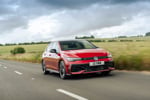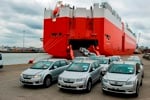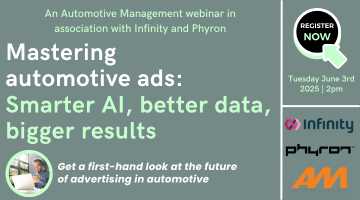For years there have been prophecies of doom for franchised new car dealers.
Many predicted that the internet would create routes to market that would cut out the need for the dealer altogether.
But while times have been tough, this has been more cyclical than systemic.
The internet hasn’t changed the world for shifting high value objects like cars, or at least not yet.
But electric vehicles (EVs) could be the spark for radical change.
Innovation and an attractive taxation environment could drive the market in a wholly unexpected direction.
This isn’t necessarily the end for the traditional dealer, but there is an urgent need to reimagine the market and to ensure that dealers benefit from electrification of cars, rather than becoming another victim of a changing world.
The Amazon effect
There are plenty of lessons from the high street about what happens when household names fail to adapt to a rapidly altering landscape.
Famous names such as Woolworths, Thomas Cook and BHS have been swept away by the tide of success of online retailers. Thomas Cook failed either because they either couldn’t forsee the future or were unable to do anything to adequately embrace it.
Success in a changing world appears depends on agility, which often enables new starters to adapt quickly to three factors: Innovation, Convenience and Taxation.
Innovations such as the internet changed the way in which consumption could take place, but critically this wasn’t limited to using the internet as the delivery method for digital services.
It was in the supply of physical product where changes happened most quickly.
Amazon didn’t invent the internet, but they recognised the power of the new technology quickly and left the high street struggling to catch up.
Good shops have survived and dealers might think that customers will always feel the need to physically see and test a car before buying.
But that logic was also thought to apply to clothes – the problem is that many customers now go to the High Street to touch and try on garments, but then go home and order more cheaply and conveniently online.
This highlights the third critical factor, customer convenience.
More than ever, success depends not only on giving the customer what they want, but also on ensuring that a purchase is made as easy as possible.
The final factor is taxation.
The VAT effect
Amazon benefited, and still benefit, from a tax environment which is outdated and focussed on traditional sales models.
This has enabled Amazon, Google and others to base themselves in low tax jurisdictions and, for example, to make supplies of innovative digital products from countries where indirect taxes were beneficial.
For example, Luxembourg became the natural base for suppliers of e-books because they allowed a reduced VAT rate to be applied.
Amazon were also able to connect suppliers outside the EU (e.g. China) to customers in the UK and allow those customers to pay no VAT at all due to low value import consignment relief – this loophole has only recently been closed.
Those key factors apply equally to the emerging market in EVs.
They are innovative and appeal to consumer demand for cleaner, greener lifestyles.
In reality, they probably deliver less than most people think.
EVs have a smaller CO2 footprint because of the efficiency of battery-electric drivetrain, but a crucial aspect of the lifetime CO2 footprint of EVs is the energy used to manufacture the battery packs.
More than one study has claimed that battery pack production consumes so much energy that it takes significant mileage before the EV has ‘worked off’ the CO2 released during its manufacturing.
Furthermore, Europe’s power production is still over-reliant on fossil fuels: greenhouse gases are produced each time an EV is charged.
A study by the University of Liège in Belgium, concluded that an electric car using a 60kWh battery made in Europe would have to travel 435,000 miles before it is “greener than an average petrol car”.
However, with a fully-renewable European grid would reduce the EV’s CO2 lag to just 18,640 miles
Despite such statistics customers believe in the cleaner claim, but they remain concerned about the convenience issue.
Clearing the EV hurdles
There is the obvious obstacle of how far an EV can travel, and all round a petrol engine seems more convenient.
The first task for a customer buying an electric car is to organise charging at home, which will mean installing a charge point and possibly a change in energy supplier given that home consumption of electricity is likely to double.
It makes buying an EV a bit more laborious, and most consumers are lazy.
Solving this convenience issue needs to be right at the forefront of a dealer’s interaction with customers.
There are already new suppliers in the market from an unexpected sector – some energy companies are selling or leasing cars online in a bundle package which includes the vehicle, charge point, attractive energy tariff and even the possibility of selling power back to the grid from your EV at times of high demand.
Ultimately, the role of green credentials and convenience will be trumped by customer’s financial considerations.
Norway is leading the way in EV ownership and the overwhelming majority of people purchasing EVs there report that the number one reason is economic.
This is where taxation plays a critical role where pacesetters can benefit from the slowness of governments to adapt taxation to a changed environment.
The taxation burden on fuelling a traditional petrol or diesel vehicle dwarfs the taxation of EV use. For example, at £1.30 per litre, the driver of a typical diesel vehicle pays over 8p per mile in tax.
The EV driver benefits doubly: there is no excise fuel duty; and VAT on domestic electricity is at 5% compared to 20% for petrol and diesel. The tax per mile can be as little as 0.2p or 40 times less than that applied to traditional cars.
Manufacturers know that they must change their offering or face significant EU fines for selling vehicles with a high carbon footprint.
EVs are likely to be the vehicle of choice within five years and manufacturers will choose whatever route to market works the most effectively.
If dealers are to compete, they will need to reposition themselves as providers of mobility solutions and not just of cars.
Forming effective partnerships with electricity suppliers, charge installers and data information networks are all necessary to ease the customer transition to the new world of EVs.
Author: Glyn Edwards, VAT director, MHA MacIntyre Hudson















Login to comment
Comments
No comments have been made yet.